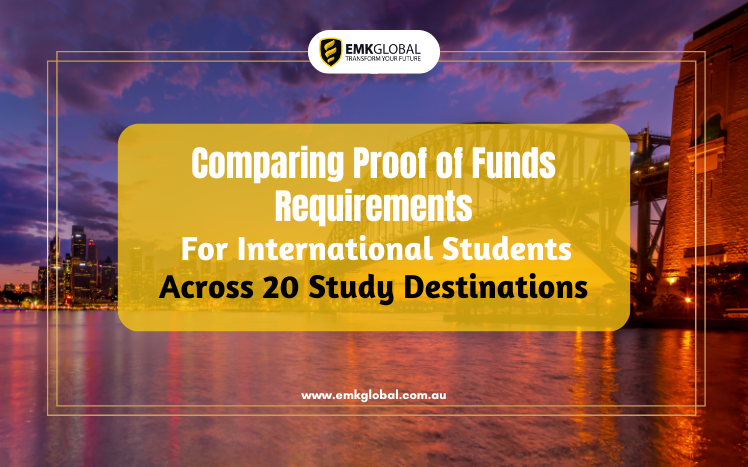When it comes to studying abroad, one crucial aspect for international students is the proof of funds requirement set by governments of various study destinations. This requirement mandates that prospective international students have a certain amount of funds immediately accessible to them to be eligible for a study visa. In 2024, there is considerable variation in these minimum requirements across different countries, ranging from less than US$5,000 to over US$15,000. Here, we delve into the details of proof of funds requirements across 20 study destinations, highlighting the diversity and impact of these financial considerations on students’ study abroad decisions.
Understanding Proof of Funds Requirements
The table below presents the proof of funds requirements for international students in 2024 across 20 study destinations:
| Study Destination | Proof of Funds Requirement (USD) |
|---|---|
| Australia | $15,690 |
| Canada | $14,930 |
| China | $2,500 per year of study |
| Czech Republic | $1,600 per year |
| Finland | $7,560 per year |
| France | $5,895 for nine months |
| Germany | $11,952 for one year |
| Ireland | $10,680 immediately available |
| Italy | $3,375 for nine months |
| Japan | $12,970 for one year |
| New Zealand | $11,840 per year |
| Portugal | $10,500 for 12 months |
| Singapore | $6,175 |
| South Korea | $20,000 |
| Spain | $5,400 for nine months |
| Switzerland | $23,070 per year |
| UAE | Varies by university, up to $15,000 |
| UK | $14,940 for nine months |
| US | Varies by institution, can exceed $70,000 for one year |
Key Insights and Analysis
- Variation in Requirements: The data reveals significant diversity in proof of funds requirements. While some countries like China and Singapore have relatively lower requirements, others such as Switzerland and the US set high financial benchmarks for international students.
- Impact on Students: Higher proof of funds requirements can act as a deterrent for some students, influencing their choice of study destination based on affordability and accessibility.
- Considerations Beyond Funds: It’s important to note that proof of funds is just one factor among many influencing students’ decisions. Quality of education, job prospects, immigration policies, and cultural factors also play pivotal roles.
- Dynamic Nature: Proof of funds requirements can change annually and may vary based on factors such as the student’s country of origin and the type of study program.
- Consultation and Research: Students and agents are advised to consult individual institutions and government sources for up-to-date information on proof of funds requirements.
Conclusion
In conclusion, while proof of funds is an essential aspect of studying abroad, it’s part of a broader spectrum of considerations that international students weigh carefully before making their educational journey decisions. Understanding these financial requirements alongside other factors is crucial for making informed choices and ensuring a smooth study experience abroad.


